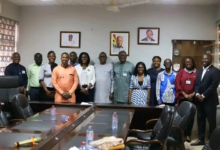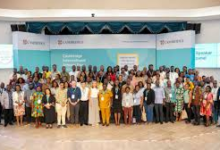
The two persons quarantined at the Greater Accra Regional Hospital (GARH) after testing positive for COVID-19 are responding to treatment, Medical Director, Dr Emmanuel Srofenyoh has confirmed.
According to him, though there is no approved medication for the disease yet, the “supportive care” being given to patients had proved helpful as both individuals are “doing well, they are not in any form of danger and are recovering.”
“The care we are providing now is supportive care where we help you with infusions and multivitamins to strengthen your immunity so that you yourself can fight the condition and so far they are responding well to treatment,” Dr Srofenyoh said.
The Medical Director made the disclosure yesterday during a visit by the Minister of Sanitation and Water Resources, Cecilia Abena Dapaah to the facility to assess their water situation amidst the provision of hand washing facilities as part of precautionary measures to protect staff and the general public against the disease.
Dr Srofenyoh intimated that in line with the World Health Organisation (WHO)’s guidelines, the hospital would conduct repeated tests on both individuals to ascertain their susceptibility or otherwise to the disease.
“The first patient is yet to reach the number of days for a repeated test but per international standards, testing is repeated in seven days from the last test and from there we monitor every two days.
“Should the repeated test turn out negative, we still keep them and repeat another in two days and if it is persistently negative, we presume they are cured, then, we can discharge them,” he stated.
Although the GARH had been designated as an isolation centre, the Medical Director allayed fears that the move posed a threat to general patients or staff indicating that “the isolation centre is far away from this place and the safety of services isn’t compromised in any way.”
He was however concerned that people continued to troop the facility demanding testing for COVID-19 upon suspicion that they had come into contact with infected persons maintaining that, tests could only be carried out if one met the standard criteria.
“Per standards, once u feel you have come into contact with someone who is a possible case or travelled to an affected country, you are to quarantine yourself for two weeks and at earliest onset of symptoms like cough, fever etc, then you can report to various hospitals for testing.
We want the public to cooperate with us. Some people rush here for testing but when we do so too early it may be negative and that may give you false hope,” the Consultant Obstetrician Gynecologist stated.
On the issue of water supply and precautionary measures taken by the hospital, Dr Srofenyoh said hand sanitisers had been placed at vantage points as the hospital had enough water to conduct its operations “though in rare cases we have shortages.”
He appealed to the Ghana Water Company to dedicate special lines to designated health facilities to ensure constant flow of water.
The Minister of Sanitation and Water Resources, Madam Dapaah assured that her Ministry would make sure the hospitals had adequate water supply at all times.
She however urged that Ghanaians complied with the WHO guideline to wash hands under 20 seconds to conserve the resource to supply others in need as well.
BY ABIGAIL ANNOH





